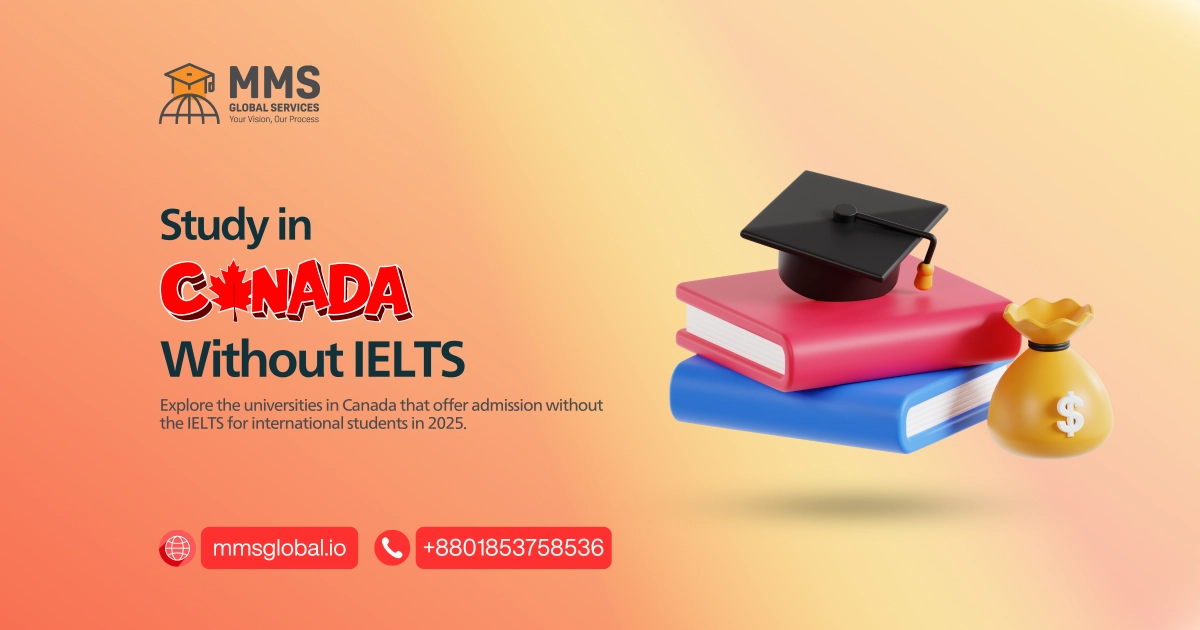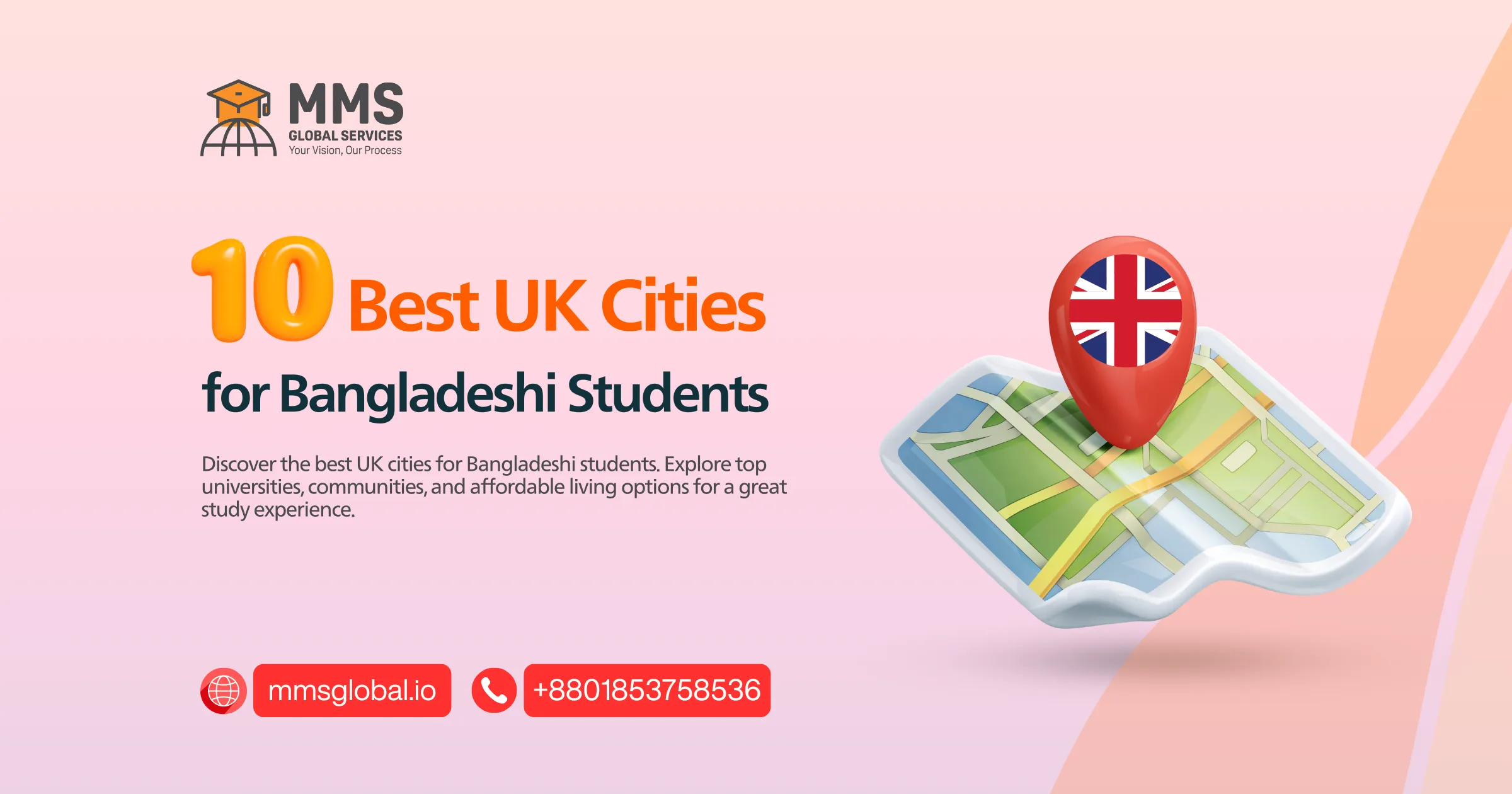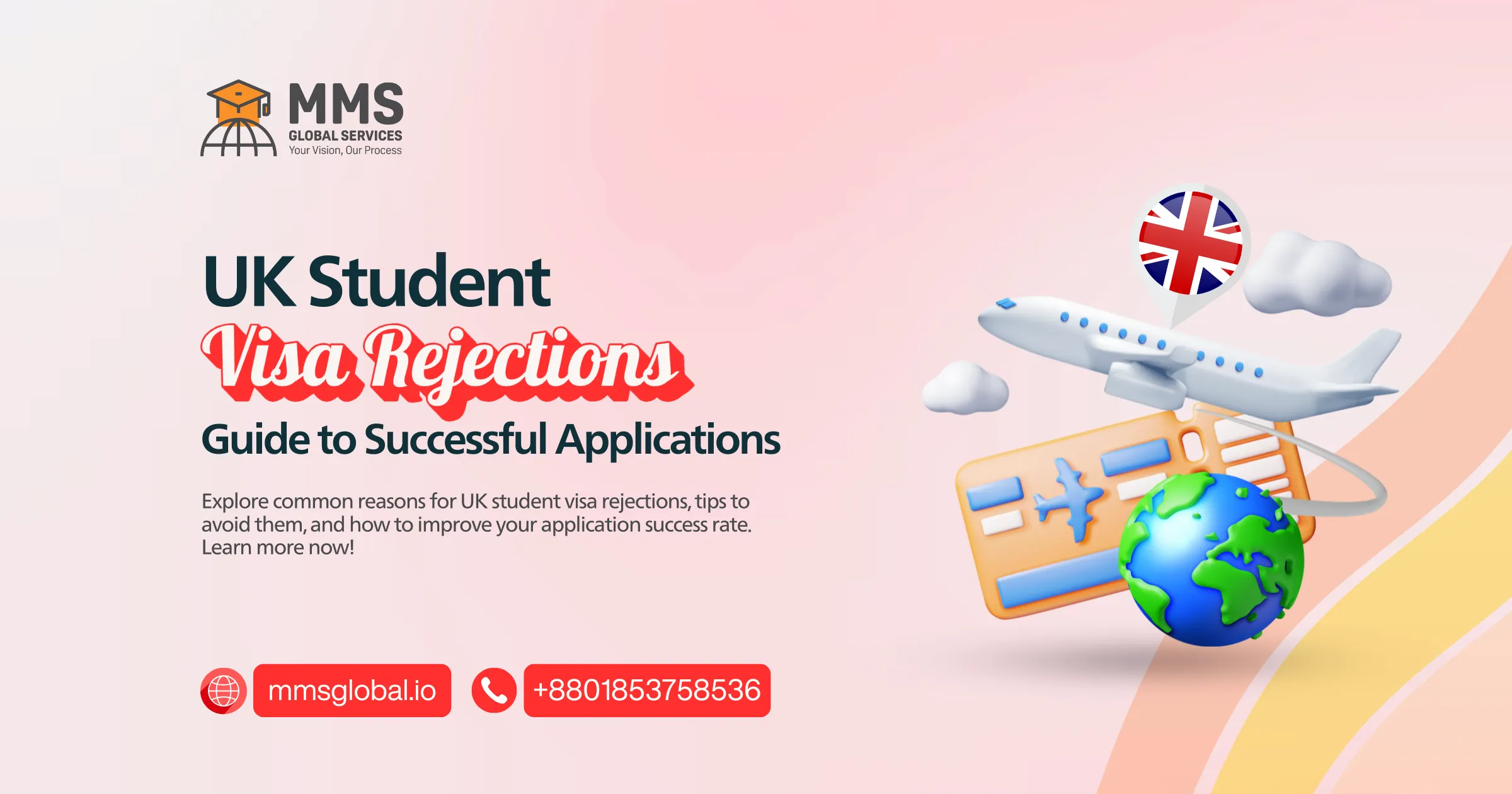Studying abroad can seem scary, like when you need to show you’re good at English. Many students from Bangladesh want to go to Canada but worry about the IELTS test. But, you can study in Canada without IELTS by using tests like PTE, TOEFL, and Duolingo.
Over 5,000 universities worldwide accept Duolingo scores. More than 190 countries and 11,000 schools accept TOEFL scores. We’ll help you understand how to get into Canadian schools without taking the IELTS. We’ll look at other English tests and schools that don’t need IELTS.
There are many choices for those wanting to study in Canada without IELTS 2025. Many universities in Canada accept other English tests. We’ll give you the info you need to make it happen.
Universities like the University of Winnipeg and the University of Saskatchewan don’t need IELTS. They accept other English tests instead. We’ll look at your options and help you succeed in your studies, making it possible to study in Canada.
Understanding the Canadian Education System for International Students
Exploring the chance to study in Canada without an IELTS means getting to know the Canadian education system. It’s built to offer top-notch education to students from abroad. It focuses on active learning and speaking English well. Many Canadian universities don’t require IELTS, giving students other ways to show their English skills.
Students can pick from public and private schools, colleges, and language centers. The school year and when you can start vary by school. But, most Canadian universities and colleges welcome international students twice a year, offering admission without IELTS in many cases. To skip the language test, students can take other English tests or ask for a waiver.
Structure of Canadian Higher Education
Canada’s higher education system includes universities, colleges, and institutes. Each offers different programs and courses. Some schools might need special proof of English skills, like a waiver.
Academic Calendar and Intake Periods
Canada’s school year has two main starts: fall in September and winter in January. Some schools also have a summer start. Knowing when to start is key for students planning to study in Canada without the (IELTS) International English Language Testing System.
Types of Educational Institutions
Canada has many schools to choose from, like public and private universities, colleges, and language centers. Many don’t need IELTS, and some offer other English tests or waivers. Students can pick the best school for their goals and needs.
Why Consider Studying in Canada Without IELTS
Studying in Canada is a great chance for international students. Canada has many programs that don’t need IELTS. It’s known for quality education. The average IELTS exam cost is 223.42 CAD, which might be too much for some.
Some universities in Canada accept TOEFL scores instead of IELTS. For example, Brock University prefers a TOEFL score of 88 iBT. This makes it easier to get a Canada study visa without IELTS.
Here are some benefits:
- Financial savings: No need to spend money on IELTS preparation and exam fees
- Increased accessibility: More universities and colleges are available to international students
- Broader range of programs: Students can choose from a wider range of courses and programs
Studying in Canada without IELTS for international students is a great way to experience Canadian culture and education. We suggest looking into colleges and visa options to find the best fit for you.
Alternative English Proficiency Tests Accepted in Canada
Studying in Canada requires English language skills. IELTS is popular, but not the only choice. Duolingo, TOEFL, and PTE are also accepted instead of IELTS. Over 11,000 universities worldwide accept the TOEFL, and more than 4,000 accept Duolingo.
Students can study in Canada without IELTS by showing English skills through other tests. Some universities might not need IELTS. It’s important to check each university’s IELTS requirements.
- Duolingo English Test
- TOEFL iBT
- PTE Academic
- Cambridge English Qualifications
These tests show English skills and help get into universities in Canada. By using these tests, students can study in Canada without IELTS. They can enjoy Canada’s top education system.
Top Canadian Universities That Don’t Require IELTS
Many international students face challenges with the IELTS. But, there are alternatives to IELTS for Canada. Many Canadian universities without IELTS offer programs for international students. This makes getting into Canadian education without IELTS easier.
Top universities in Canada without IELTS include the University of Saskatchewan, the University of Winnipeg, and the University of Guelph. They have programs in business, engineering, arts, and sciences. For example, the University of Saskatchewan needs a TOEFL score of 86 with a minimum of 19 in each area.
Other notable many universities in Canada include Brock University, Memorial University of Newfoundland, and Carleton University. They accept TOEFL, Duolingo English Test, and PTE. Some universities also offer waivers or exemptions, like Concordia University, which waives tests for those with three years of studies at an approved university.
Here are some key highlights of the Canadian Academic English language proficiency requirements for these universities:
- University of Saskatchewan: TOEFL score of 86 with minimum scores of 19 in each area
- University of Winnipeg: TOEFL score of 88 iBT with at least 21 in Speaking
- Brock University: TOEFL score of 88 iBT with at least 21 in Speaking
- Memorial University of Newfoundland and Labrador: TOEFL score of 90 with at least 20 in Reading and Listening and no less than 25 in Speaking and Writing
These universities in Canada without IELTS offer a great chance for international students. They can pursue their Canadian academic goals without requiring IELTS score. This makes education without IELTS in Canada more accessible and affordable.
English Language Proficiency Waivers and Exemptions
Many international students face a big challenge in English language tests. Luckily, some universities to study in Canada offer waivers and exemptions. This means you can study in Canada without IELTS if you meet certain criteria.
For example, if you studied English before, you might not need to take the IELTS exam. This is great news for those wanting to study in Canada without IELTS.
Some key exemptions include:
- Previous education in English: Students who studied in English for at least 10 years might not need a test.
- Work experience: Those with English-speaking work experience could also get exemptions.
- Country-specific exemptions: Students from places like Australia, the UK, or the USA might not need a test.
Remember, universities and colleges in Canada have their own rules for English language waivers and exemptions. It’s a good idea to check with your chosen university. This way, you can find out if you qualify for any exemptions. This can make getting into Canadian schools easier and help you reach your study goals.
Application Process for Study in Canada Without IELTS
Students to study in Canada without IELTS can use tests like TOEFL, CAEL, or Duolingo English Test. They need to apply to a Canadian university and send in important documents. These include school records, letters of recommendation, and English test scores.
Several universities in Canada offer scholarships for international students. This can help cover education costs. Students can also apply for a study permit without IELTS by showing they have enough money and meet the permit’s requirements.
Here are the documents needed for a Canadian study permit without IELTS:
- Transcripts or Marksheet of previous education
- GMAT or GRE scores (if applicable)
- Statement of Purpose (SOP)
- Letters of Recommendation (LOR)
- Acceptable English Proficiency Test Scores
- Proof of sufficient funds to study in Canada
Students can also look into immigration programs like the Canadian Experience Class or the Federal Skilled Worker Program. Knowing the application process and requirements helps students apply for a study permit in Canada without IELTS. This way, they can reach their academic goals.
| University | Alternative English Proficiency Tests Accepted |
|---|---|
| University of Saskatchewan | TOEFL, CAEL, Duolingo English Test |
| University of Winnipeg | TOEFL, CAEL, PTE |
| Concordia University | TOEFL, CAEL, Duolingo English Test |
Student Visa Requirements and Documentation
As international students planning to study in Canada, we must meet certain visa requirements. We need to provide required documentation. Canadian universities accepting Duolingo Making it easier for students to apply can help those who wish to study without IELTS scores.
We must show proof of financial support, medical examination results, and a letter of acceptance. The average processing time for a Canada study visa is about 5 weeks. The study permit processing fee is CAD $150. Also, a biometrics fee of CAD $85 is needed for identity verification.
Some key documents required for a student visa application include:
- Proof of financial support
- Medical examination results
- Letter of acceptance from a Canadian university
- English language proficiency test scores, such as Duolingo
Work while studying in Canada is an option. It allows students to gain work experience and support themselves financially. We can work part-time on campus or off campus, depending on our study permit conditions.
It’s essential to note that the minimum financial requirement for living costs is CAD 20,635. This is in addition to tuition and travel expenses. By understanding these requirements and providing the necessary documentation, we can successfully apply for a student visa in Canada without IELTS in 2025.
| Document | Requirement |
|---|---|
| Proof of financial support | CAD 20,635 (minimum) |
| Medical examination results | Valid for 12 months |
| Letter of acceptance | From a Canadian university |
Scholarship Opportunities for Bangladeshi Students
Exploring how to study in Canada, it’s key to look at different ways to study there. This includes English tests accepted in Canada. Bangladeshi students have many scholarship options to fund their studies and living costs. These scholarships can greatly reduce financial stress, allowing students to focus on their studies.
Some top scholarships for international students in Canada are the Shastri Research Student Fellowship, Canadian Commonwealth Scholarship, and Ontario Graduate Scholarship. These scholarships offer funding from CAD 500 to CAD 10,000. They support various study levels, like undergraduate, graduate, and postdoctoral research.
Many Canadian universities also offer their own scholarships. For example, Lakehead University’s International Undergraduate Entrance Scholarship can give up to CAD 40,000. To qualify, students must show good grades, have a valid study permit, and be active in community service.
| Scholarship Name | Value | Duration |
|---|---|---|
| Shastri Research Student Fellowship | CAD 500 – CAD 1,000 | 8-12 weeks |
| Canadian Commonwealth Scholarship | CAD 10,000 | 5-6 months |
| Ontario Graduate Scholarship | CAD 5,000 per session | up to 3 sessions |
By looking into these study paths in Canada and the English tests accepted, Bangladeshi students can boost their scholarship chances. This way, they can reach their academic goals in Canada.
Work Opportunities While Studying in Canada
International students often look for ways to support themselves while studying abroad. For those studying in Canada without IELTS, there are many work options. Canada offers part-time and full-time jobs to international students at universities and colleges.
Students can work in Canada part-time on campus or off campus with a work permit. This helps gain work experience and fund living expenses. After graduation, students may get a post-graduation work permit. This can lead to permanent residency in Canada.
Some key points to consider for work opportunities in Canada include:
- On-campus employment: Many universities offer part-time jobs to international students.
- Off-campus work permits: Students can work part-time or full-time with a work permit.
- Post-graduation work options: Eligible students can apply for a post-graduation work permit.
With the right guidance and support, international students can thrive in Canada without IELTS. They can set themselves up for success in their future careers.
Cost of Living and Tuition Fees
When you think about studying in Canada without IELTS, remember the cost of living and tuition. Canada is pretty affordable for international students. Tuition fees are lower than in many English-speaking countries.
The cost of living and tuition fees change based on where you are and what school you choose. For example, tuition can be between CAD 13,000 and CAD 40,000 a year. This depends on the program and school.
We’ll look at the average annual fees for different programs. Here’s what you can expect to pay:
- Undergraduate program: CAD 13,000 to CAD 20,000
- Postgraduate master’s degree: CAD 17,000 to CAD 25,000
- Doctoral degree: CAD 7,000 to CAD 15,000
- MBA: CAD 30,000 to CAD 40,000
Living costs in Canada, like housing and food, can be between CAD 15,000 and CAD 20,000 a year. Many schools in Canada offer low tuition and living costs. This makes it easier for international students to apply for a Canada student visa without IELTS.
Housing Expenses
On-campus housing costs are between CAD 8,000 and CAD 10,000 a year. Here are some monthly costs for different types of housing:
- Hostels: CAD 300 – CAD 600
- Private apartment: CAD 400 – CAD 1,500
- Shared rental: CAD 250 – CAD 700
- Homestay: CAD 400 – CAD 800
Overall, managing living costs and tuition in Canada is doable with good planning. Many schools offer scholarships and financial aid. This helps international students cover their expenses. By considering these costs, students can make a smart choice about studying in Canada.
Tips for a Successful Canadian Study Application
Studying in Canada requires understanding the application process well. We can boost our chances by researching schools and programs. Also, preparing documents and applying for scholarships and study permits is key. If you’ve studied in English or have work experience, you might get an English language exemption.
To get a study visa without IELTS, you must meet certain criteria. This includes scoring well on tests like TOEFL or Duolingo. If you’ve studied in English or have work experience, you might not need IELTS. Here are some helpful tips:
- Look for universities and programs that offer English language exemptions or alternative tests.
- Get your documents ready, like transcripts and language proficiency proof.
- Apply for scholarships and study permits early to avoid delays.
By following these tips, we can improve our chances of a successful application. This will help us achieve our academic goals in Canada.
Stay organized and don’t hesitate to ask universities or immigration authorities about the application. They can help with any questions or concerns.
| University | English Proficiency Test | Study Program |
|---|---|---|
| University of Toronto | TOEFL, IELTS | Undergraduate, Graduate |
| University of British Columbia | TOEFL, IELTS, Duolingo | Undergraduate, Graduate |
Conclusion
Studying in Canada without IELTS opens up many opportunities for international students. More universities now accept tests like Duolingo English Test, TOEFL, and PTE, allowing students without IELTS to pursue their studies. This makes getting into a Canadian school easier and cheaper.
There are also scholarships and financial aid for students who don’t need IELTS. Programs like the Banting Postdoctoral Fellowships and the Trudeau Doctoral Scholarship help. They make studying in Canada more affordable for Bangladeshi students.
By using IELTS alternatives and looking at different Canadian universities, students can find great opportunities. With the right help and planning, Bangladeshi students can succeed in their studies in Canada.





